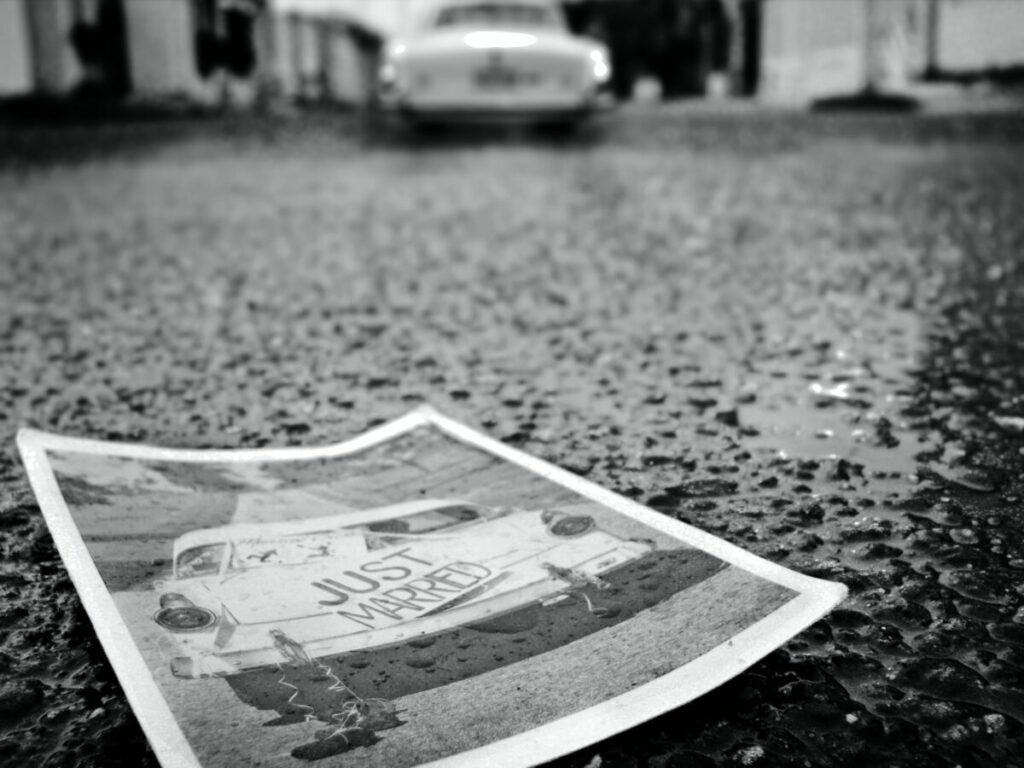
She kept track of what belonged to her and what belonged to him. She felt guilty, but also compelled.
The silver coffee spoons were hers, a family heirloom and dormant in a back drawer since she didn’t throw those kinds of parties anymore. The spinning top collection that reminded him of a similar basket from his childhood were his.
The vintage bomber jacket mixed in among the coats, the one that still smelled faintly of club cigarettes and highway exhaust, that was hers. The white plates, chipped with use, and the ceramic mugs with cartoon characters on them were his.
The coffee table books on fancy tree houses were his; the decorated hollow eggs from Austria were hers.
Some mornings, she would pause in front of the display case in the foyer to gaze at its contents. She stayed alert for things that were neither his, nor hers, laying her fingertips on the smudged glass as she made her mental list:
His: the miniature salt bowl and tiny spoon, bought for the child obsessed with fairies.
Hers: the witty piece of art called “Nesting,” its unmade ceramic bed entangled in thorny branches, bought as a young woman with her first paycheck.
His: the antique watch, removed from its fob and mounted on black velvet, from his father’s father’s father, still showing the nicks from carrying it in the mines.
Hers: the silhouette cut-out portrait of a woman looking out a window, her fingers resting on the open pages of a book in her lap.
The workshop of Bosch power tools was his. But the efficient folding case of wrenches and screwdrivers with exchangeable tips was hers, though she never had cause to use it now that she deferred to the efficacy of his tool shop.
The things that worried her were the ones they’d gotten together: the colorful painting of a sunrise (or maybe sunset) that they’d both felt drawn to, but for different reasons; the house with its cozy corners for him and sleek entertainment spaces for her; and the dog (but she didn’t let her mind go there, because she was no Solomon).
The land in Texas, pounded and punished by mineral drillers and gas-frackers, was hers, a hedge against a fear she hated herself for having. The minivan and the mortgage were his.
The memories were both of theirs, and could not be evenly divided. The times they stopped for espresso in a Roman alleyway on their honeymoon, dismayed at the graffiti sprayed on the ancient plaster walls. How they’d lain side-by-side on their stomachs flipping through Zillow listings for houses and talking about their ideal home. How he claimed to have bought the I-Pad for himself, but it had been his tricky way of giving it to a technologically-reluctant spouse. How she signed both their names on the Christmas presents she bought for his children, on the holiday cards they mailed to her friends.
The compassion and diplomatic tact were his, as was the need to tell the same story numerous times to gauge her interest in him and the irking refusal to not say a thing outright. The flashes of fury, fast-moving summer storms of tears, and the need was hers. Except when it was his. The children were his, of course. And sometimes she stopped to consider whether she would miss them if he took them and went. But she suspected that after awhile they would become like some document she had thought too important to throw away and then hadn’t given another thought to until coming across it looking for something else. The suspicion was all hers, and kept her on the look-out for unusual phone numbers on his phone, strange perfumes on his clothes, aware that she, too, had once been a strange perfume on his clothes.
The recipes for anise cookies, lemon blossoms, and chicken mukti were his, while the recipes for cheese soufflé, pot de crème, and Harvey Wallbanger cake were hers, and her mother’s before her, though they remained unused. The recipe for farm-style broccoli salad had been given to them by a former neighbor of his with such open acceptance of her that she felt certain they would each take a copy of it.
The hand-bound scrapbook she’d made for him on the first anniversary of their living together, before they’d gotten married—the one with magazine cut-outs, memorable quotes from their courting, and personal jokes—was his. Every now and then, while she lay on the bed waiting for him to finish putting a child to sleep, she slipped it out from between his treasured books and paged through it wondering in whose custody it would end.


Share this post with your friends.

A short story should first of all be interesting. This one is. Rare among published fiction these days.